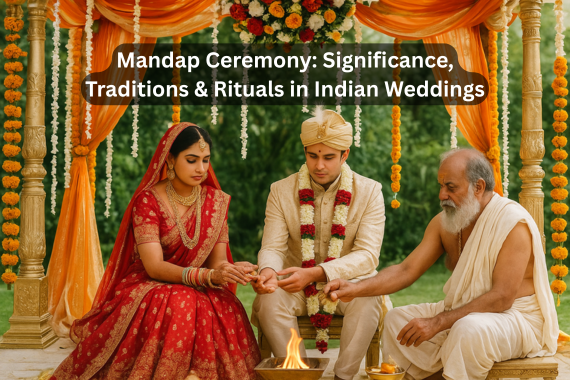Mandap Ceremony: Significance, Traditions & Rituals in Indian Weddings


Introduction to the Mandap Ceremony
Weddings in India are not just a union of two people but a sacred merging of families, cultures, and spiritual traditions. At the heart of this grand celebration lies the Mandap ceremony, a ritual-rich event performed under a beautifully decorated structure where the most sacred vows are exchanged.
What is a Mandap?
A Mandap is a decorated canopy or pavilion with four pillars, often built in the center of the wedding venue. It serves as the sacred stage where the bride, groom, and their families come together to perform the main wedding rituals.
Importance of Mandap in Indian Weddings
The Mandap symbolizes purity, sanctity, and the beginning of a new chapter. It represents a sacred space where the couple ties the knot in the presence of Agni (the sacred fire) and divine blessings.
Historical and Cultural Background
Origins of the Mandap Ritual
The roots of the Mandap trace back to Vedic times, when marriages were solemnized in open courtyards under temporary structures. Over centuries, the Mandap evolved into a centerpiece of grandeur and symbolism.
Regional Variations Across India
While the essence of the Mandap remains universal, its design, rituals, and decor differ regionally. In North India, mandaps are lavishly adorned with flowers, while in South India, banana leaves and coconuts hold prominence.
Structure and Design of the Mandap
Symbolism of the Four Pillars
The four pillars of the Mandap are not just structural but deeply symbolic.
Representation of Life’s Four Goals (Purusharthas)
Dharma (righteousness)
Artha (prosperity)
Kama (love and desires)
Moksha (spiritual liberation)
These pillars remind the couple of their duties and responsibilities toward each other and society.
Traditional Materials Used
In earlier times, mandaps were made using bamboo, wood, and cloth, symbolizing simplicity and connection with nature.
Modern Innovations in Mandap Design
Today, mandaps have transformed into artistic masterpieces with glass, crystals, LED lighting, and designer themes, reflecting the couple’s personal style.
Rituals Performed at the Mandap
Ganesh Puja – Invoking Auspiciousness
Every ceremony begins with prayers to Lord Ganesha, removing obstacles and ensuring smooth proceedings.
Kanyadaan – The Sacred Offering
In this ritual, the bride’s parents entrust their daughter to the groom, symbolizing the ultimate act of love and responsibility.
Mangal Pheras – The Seven Vows
The couple takes seven rounds around the sacred fire, each vow representing a promise of companionship, loyalty, and mutual respect.
Sindoor and Mangalsutra – Marking the Union
The groom applies sindoor (vermillion) and ties the mangalsutra (sacred necklace), signifying the bride’s new status as his life partner.
Spiritual Significance of the Mandap
The Mandap as a Sacred Space
The Mandap acts as a miniature temple, turning the wedding into a divine act witnessed by deities and elders.
Connection Between Fire (Agni) and Marriage
Agni, the sacred fire, is the divine witness to the vows. Couples promise each other in front of this eternal element, symbolizing purity and commitment.
Mandap Traditions in Different Communities
Hindu Mandap Rituals
Most Hindu weddings across India follow similar core rituals of Ganesh puja, Kanyadaan, Pheras, and Sindoor.
Gujarati Wedding Mandap Customs
In Gujarati weddings, rituals like Madhuparka (groom’s feet washing) and Hasta Milap (joining of hands) take place under the Mandap.
South Indian Mandap Traditions
South Indian mandaps are adorned with banana stems, coconuts, and turmeric. Rituals like Kashi Yatra and Mangala Snanam are performed here.
Modern Adaptations of Mandap Ceremony
Destination Weddings and Designer Mandaps
Couples today are opting for beach mandaps, palace setups, and resort-style ceremonies, blending tradition with luxury.
Fusion of Traditional and Contemporary Styles
Crystal chandeliers, floral domes, and digital lighting now merge with age-old rituals, creating a perfect balance between heritage and modernity.
Role of Family in the Mandap Ceremony
Bride’s Family Responsibilities
From performing Kanyadaan to welcoming the groom’s family, the bride’s family plays a central role in Mandap traditions.
Groom’s Family Participation
The groom’s family assists in rituals like Pheras and blessings, ensuring the union is celebrated harmoniously.
Symbolic Decorations and Elements
Flowers and Garlands
Flowers represent beauty, fragrance, and prosperity, and are extensively used to decorate the Mandap.
Kalash and Coconut Placement
A kalash (pot) with coconut and mango leaves symbolizes fertility and abundance.
Drapes, Lights, and Themes
Colorful drapes, fairy lights, and thematic designs add a majestic charm, making the Mandap the visual heart of the wedding.
Emotional Essence of the Mandap
A Place of Blessings and Promises
The Mandap is where promises are made for a lifetime, blessed by family and divine forces.
Memories Created Under the Mandap
Photographs, rituals, and emotional moments under the Mandap become eternal memories for couples and families.
Conclusion
The Mandap ceremony is more than a ritual—it is a sacred theatre of love, tradition, and spirituality. From its symbolic pillars to the fire that bears witness, the Mandap stands as a timeless emblem of marital union in Indian weddings. Whether traditional or modern, every Mandap tells a unique love story woven with heritage, blessings, and hope for the future.
FAQs
Q1: How can Invitoon enhance my Mandap ceremony invitations?
Invitoon offers beautifully designed, digital invites that capture the sacredness and traditions of the Mandap ceremony, making your wedding invites as special as the rituals themselves.
Q2: Who sits inside the Mandap during rituals?
The bride, groom, parents, and the priest are usually present under the Mandap.
Q3: Can non-Hindu weddings have a Mandap?
Yes, many couples adopt Mandap traditions as a cultural or symbolic element.
Q4: How long do Mandap rituals usually last?
The ceremony can last anywhere from 1 to 3 hours, depending on community customs.
Q5: What modern trends are shaping Mandap ceremonies?
Designer mandaps with themes, floral domes, crystal backdrops, and beach setups are trending.
Connect
Explore our customizable digital invitations today!
invitoon.store@gmail.com
+91 9243781585
© 2025. All rights reserved. Invitoon
